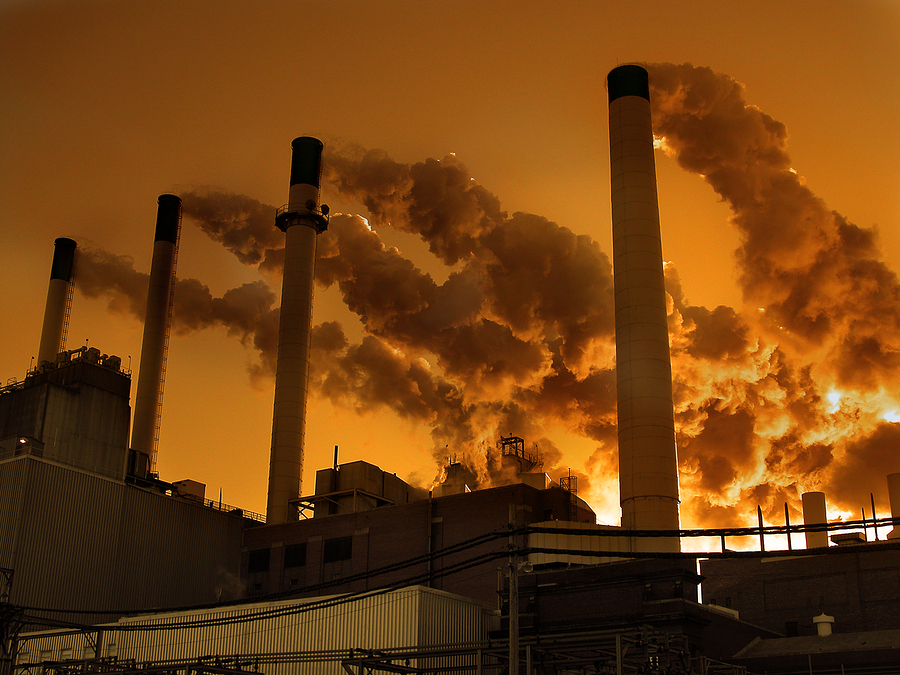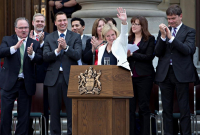Support strong Canadian climate journalism for 2025
WASHINGTON — The upcoming Paris climate summit won't result in a binding target for limiting greenhouse gas emissions below disaster-averting levels, the White House said Tuesday.
But it said the talks starting next week could still be a historic moment in the global fight against climate change, as it described its objectives in a media briefing.
The Obama administration said the summit will be a success if a larger-than-ever number of countries agree to: limit emissions, report on their progress and set up a system that allows increasing rounds of emissions cuts over time to keep temperature growth to 2C.
"That's important and unprecedented progress," said Paul Bodnar, senior director for climate change at the White House's National Security Council.
"But (it's) still above the two-degree threshold the scientific community acknowledges is necessary to avoid the most severe aspects of climate change."
The UN climate panel says human civilization would suffer catastrophic consequences under a 4C temperature growth that would be caused by business as usual by century's end.
The panel says it would require emissions cuts of more than 40 per cent by mid-century to achieve a lesser disaster: a 2C temperature increase. That kind of temperature shift, it says, would still quadruple the number of people exposed to once-in-a-century floods, degrade a third of the world's corral reefs and significantly reduce groundwater access.
According to its analysts, the submissions from countries so far would see temperatures grow 2.7C. Bodnar said that's already better than the business-as-usual forecast.
He said the strategy going into Paris is to bring everyone to the table — including big-emitting developing countries like China, India and Brazil, which avoided any commitments in the 1997 Kyoto accord.
He said that gradual approach has already helped elicit commitments from 170 countries — compared to a few dozen under Kyoto. So instead of short-term targets, the countries will focus on long-term promises, binding mechanisms for tracking progress and a system that can toughen targets over time.
The new Alberta plan is part of that global movement, said an American analyst.
Canada is still far from being on-track to meeting the climate targets set by the former Harper government, and the new Liberal government hasn't announced a target yet.
But he said the oil-producing powerhouse is a key player — and he called the new provincial plan a turning point.
"It is a dramatic turnaround," said Anthony Swift of the Natural Resources Defence Council, a big environmental group that clashed with the last Alberta government over the Keystone XL pipeline.
"There's absolutely no question the province of Alberta made a very ambitious climate announcement. That was a major step forward. It's not the end of the finish line. More will be needed over time."
The previous Harper government had a relatively similar target to the U.S.'s with a 30-per-cent emissions cut by 2030 — although, unlike the U.S., it had no plan for reaching its stated target.
Canada would need to shave off almost 250 megatonnes of greenhouse-gas emissions to achieve that target. Alberta — by far Canada's largest emitter — would reduce 50 megatonnes under its new plan.
The province produces almost two-fifths of Canada's emissions; it would chip in less than one-fifth of the 250 megatonnes in national reductions under its new plan and even those cuts would not bring the province below its emissions levels from the baseline year used to calculate the cuts, 2005.
Still, it required considerable effort to achieve that. Alberta's new NDP government has proposed a $3-billion-a-year carbon tax, a cap on emissions from the oil sector and promise to phase out coal — all while the energy industry is struggling with job losses.
Premier Rachel Notley said her government did its best to strike a balance between cutting emissions and chasing resource-sector jobs outside the province.
"We don't want to construct a system that simply serves to move emissions to another jurisdiction," Notley said.
"We want to keep the business here and improve and reduce the emissions here."
Alexander Panetta, The Canadian Press



Comments